Image: Mahanagar Telephone Nigam makes losses.
T N Ninan
Even in the protected world of India's sick public sector units, it takes a special kind of government company to lose Rs 8 crore (Rs 80 million) a day, while earning just Rs 10 crore (Rs 100 million) as revenue - and that in the booming field of telecommunications. That's Mahanagar Telephone Nigam Ltd (MTNL) for you. Its big sister, the Bharat Sanchar Nigam Ltd (BSNL), also loses Rs 8 crore a day, though it earns much more revenue - about Rs 90 crore (Rs 900 million) daily.
T N Ninan
Even in the protected world of India's sick public sector units, it takes a special kind of government company to lose Rs 8 crore (Rs 80 million) a day, while earning just Rs 10 crore (Rs 100 million) as revenue - and that in the booming field of telecommunications. That's Mahanagar Telephone Nigam Ltd (MTNL) for you. Its big sister, the Bharat Sanchar Nigam Ltd (BSNL), also loses Rs 8 crore a day, though it earns much more revenue - about Rs 90 crore (Rs 900 million) daily.
Why should taxpayers' money keep sick PSUs alive?
Image: A Raja, former telecom minister.
BSNL blames the jailed former minister A Raja for its troubles, but there must be more to the story. Now the two companies propose to merge; expect an Air India kind of situation, with staff from the two companies battling over pay and seniority many years into the future. Air India, meanwhile, provides more proof that the government is a lousy shareholder. One minister destroyed the airline.
Why should taxpayers' money keep sick PSUs alive?
Image: Air India employees during a strike.Photographs: Reuters.
Another now watches while the airline cuts flights because it has exhausted its credit and credibility, and therefore has to pay for fuel in cash. The staff, meanwhile, is not paid incentives that are equal to something like half their monthly salary in most cases - and the government expects this de-motivated staff to fight and regain lost marketshare, to offer service with a smile to passengers.
Why should taxpayers' money keep sick PSUs alive?
Image: Prasar Bharati loses Rs 2.5 crore a day.
And what about Prasar Bharati, the once supposedly autonomous broadcaster which is now once again little more than a government department? It employs 38,000 people, and loses Rs 2.5 crore (Rs 25 million) a day, to earn about as much revenue. Someone should ask the obvious question: Why is the government in the business of running phone companies, airlines and news broadcasting when it is losing large dollops of money, when private providers are doing a reasonable job, and when there is no shortage of competition?
Why should taxpayers' money keep sick PSUs alive?
Image: HMT watch.
For that matter, does the government need to make watches (at HMT), cement (at Cement Corporation of India), tyres (at Tyre Corporation of India), or shoes (at Bharat Leather)? These questions were asked frequently till a few years ago. But the United Progressive Alliance (UPA)government has become so inactive on the reforms front that most people have simply given up arguing the case for even the most obvious steps.
Why should taxpayers' money keep sick PSUs alive?
Image: Many units are closed.
For instance, a quarter of the 48 units that come under the department of heavy industry are lying closed, or have ceased operation (but are not "closed"). Many others are close to being irrelevant - like Hindustan Photo Films in the era of digital cameras, and Nepa which makes the poorest-quality newsprint at a substantial loss.
Why should taxpayers' money keep sick PSUs alive?
Image: Hero Cycle.
The shuttered companies include two bicycle makers (imagine them competing against Hero), and Mining and Allied Machinery Corporation which goes back to the heavy industry planning phase of the Second and Third Plans.
Why should taxpayers' money keep sick PSUs alive?
Image: Some PSUs in good health.
Many of the firms still up and running are companies that were taken over by the government in the heady days of nationalisation, 40 years ago, and the majority of these have struggled to make good ever since - like most of the textile mills of Mumbai that were taken over in 1982.
Why should taxpayers' money keep sick PSUs alive?
Image: Scooters India.
Privatisation is of course a risky business, because controversies erupt over valuations. Also, unless a defunct company has substantial real estate (like Scooters India, which is on the block), it is not likely to attract very high bids; and that would make a sale look unappealing.
Why should taxpayers' money keep sick PSUs alive?
Image: BSNL.
The point, however, would be to clean up the books, get rid of dead assets, and use the sale proceeds productively - as so many other countries have done. To the UPA, however, this would be capitalism red in tooth and claw. So we'll keep using our tax money to pay for MTNL and BSNL and Air India and the rest.



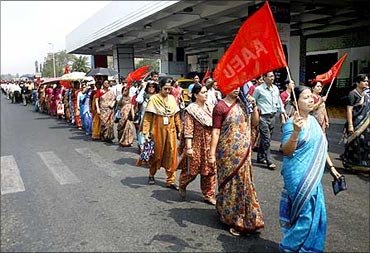
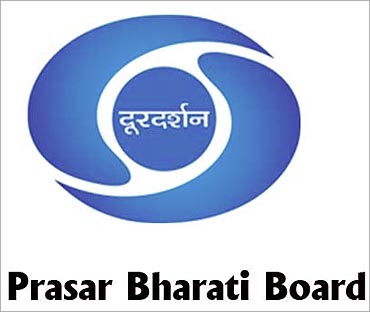

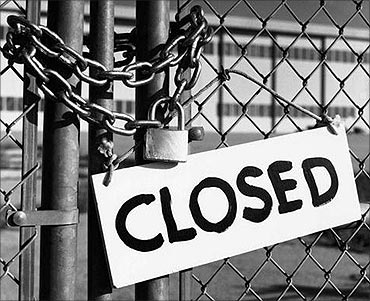

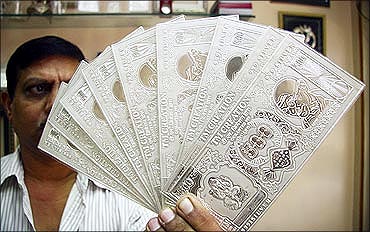
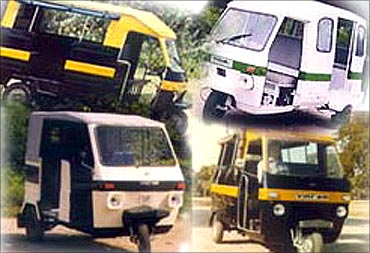


article